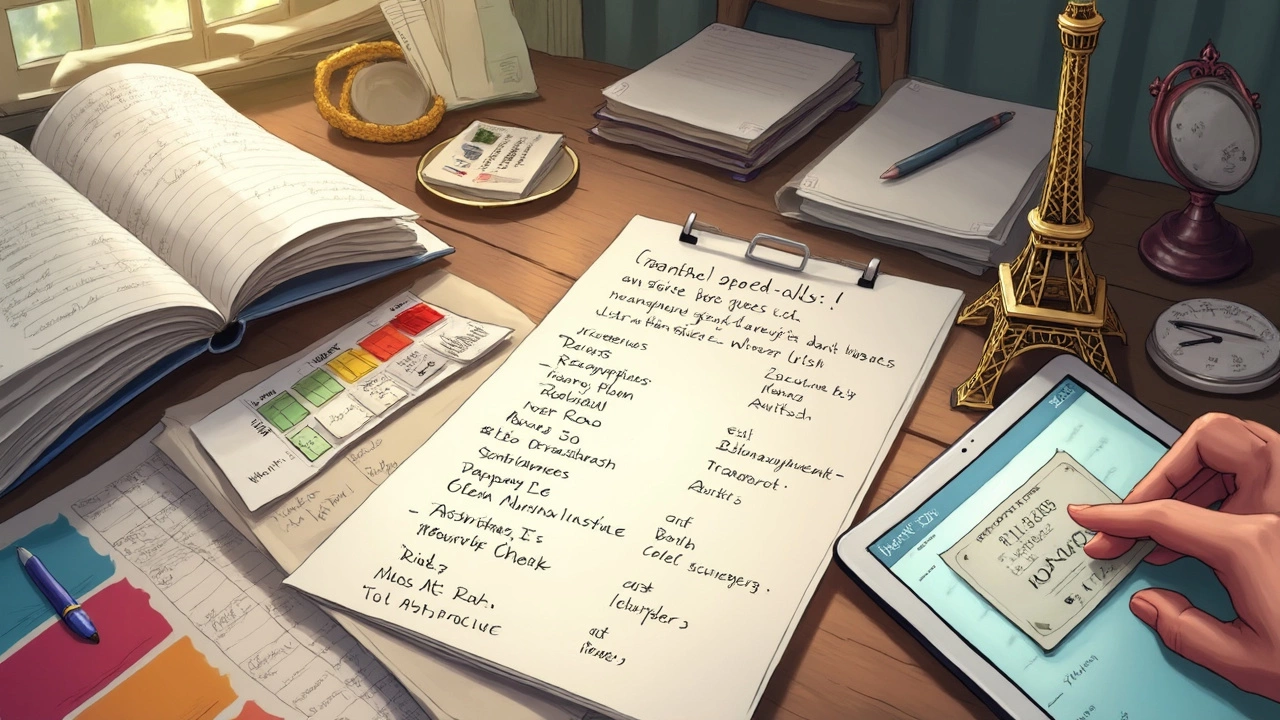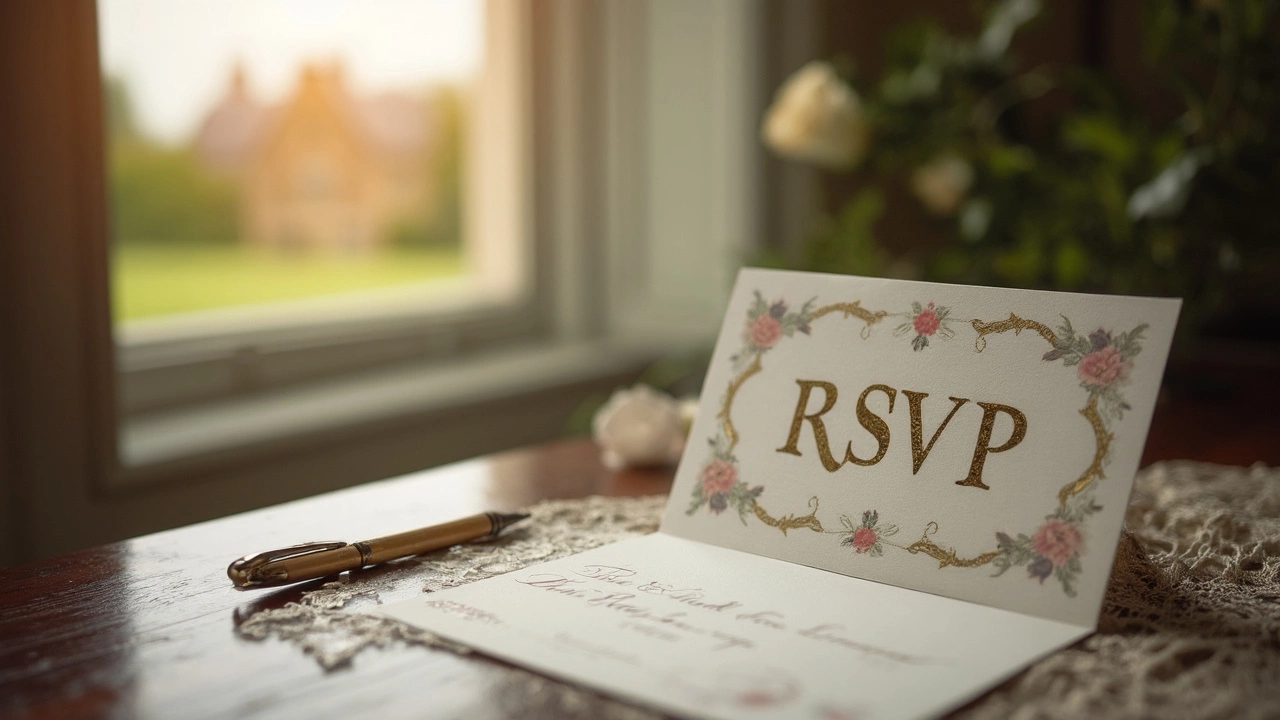Have you ever received an invitation and wondered what RSVP actually means? It turns out, RSVP is short for the French phrase 'Répondez s'il vous plaît,' which translates to 'Please respond.' But here's the kicker—what's the deal with the 'F' in RSVP?
The 'F' isn't standing in the spotlight on its own; it's part of the French phrase where 'vous' acts as both the 'V' and the 'F' when you're translating it over. Yet, more importantly, RSVP is your ticket to ensuring that the host knows how many people to expect. Imagine planning a big event like a wedding and not knowing if you've got 50 or 150 guests showing up!
Understanding the 'F' and the origins of this little acronym is not just about being polite. It affects how the whole event is planned. You'd be surprised at how not RSVPing can throw a wrench in things, from seating arrangements to catering logistics.
- The Origins of RSVP
- Decoding the French Phrase
- Why RSVP Matters
- The Impact on Wedding Planning
- Common RSVP Mistakes
- Top Tips for Perfect Wedding Replies
The Origins of RSVP
So, what’s with this fancy French acronym gracing our invitations? Turns out, RSVP has quite a history. It all starts in the 18th century. Back then, French was the language of the diplomatic world and high society, especially in places like England. Since hosting elaborate events was a big deal, the French phrase 'Répondez s'il vous plaît' was an elegant way to say, ‘Hey, can you let us know if you’re coming?’
This got me thinking about how language adapts to fit different cultures. Even though we mostly speak English today, RSVP stuck. It's like having a little slice of glamour embedded into our wedding invitations! But don't worry; you’re not expected to speak French fluently to reply.
Despite its origins, the phrase has become universal in event planning, not just weddings. RSVP helps us keep track, manage seating, and plan food. Think about it—knowing who's coming is crucial for pulling off any successful shindig.
RSVP isn't just a polite gesture from the past; it's essential for the present. Missing an RSVP can actually throw off budgets and headcounts, which is why hosts really count on those responses.
Decoding the French Phrase
So, you're off to crack the code behind RSVP. It's no secret that the term RSVP has its roots in French. Specifically, it stands for 'Répondez s'il vous plaît,' which directly translates to 'Please respond.' This simple phrase reminds guests to let the host know if they're attending an event, like a wedding.
Breaking Down the Phrase
Let's look closer. 'Répondez' is the French word for 'respond.' It might start with an R instead of F, but that’s the essential verb prompting you to take action. The phrase continues with 's'il vous plaît'—a polite addition meaning 'please.' This part of the phrase doubles as a gentle nudge rather than a command.
You might wonder how we ended up with RSVP since there's no actual 'F' in the French version. The letters are a condensed version, giving it a neat, compact form that caught on globally. In English-speaking countries, this acronym quickly became common on wedding invitations and formal events.
Why Stick with French?
Using French phrases like RSVP in formal invitations adds a bit of flair and formality. French has long been associated with elegance, making it a perfect fit for wedding invitations. While the French aren't the only ones who like to keep things stylish, this phrase has become an international standard.
Fun fact: The tradition of using RSVP dates back to the 18th century when the French court was known for its formal invites. With so many details riding on the response, it's no wonder the tradition has stuck around.
Why RSVP Matters
Responding to an invitation might seem like a formality, but it’s actually a big deal in the world of wedding invitations. Think about it: if you've ever planned an event, you know how crucial it is to have a headcount. The RSVP helps both the hosts and the guests manage expectations.
Planning and Budgeting
First off, RSVPs are essential for budgeting. Knowing the guest list allows hosts to accurately estimate food, drinks, and other essentials. For weddings, caterers charge based on the number of expected guests, so guessing could lead to either waste or shortages. Imagine having half your guests not show up and being stuck with uneaten appetizers or even worse, running out of champagne!
Seating Arrangements
Seating is another consideration. For formal events, knowing who’s coming helps with creating strategic seating plans. This ensures everyone has a good time and avoids that awkward moment when someone ends up at a table with complete strangers.
Logistics and Capacity
From venue size to staffing needs, every detail is linked to guest numbers. A packed venue might violate fire regulations, while an underfilled space looks empty and awkward. Venues often have strict capacity limits, so knowing attendance helps avoid issues.
- RSVP meaning: Signals attendance, impact on cost.
- Wedding invitations: Clarity helps with seating charts.
- Response etiquette: Shows courtesy and respect for the host's efforts.
- RSVP tips: Respond promptly to avoid planning issues.
Whether it's a grand celebration or an intimate gathering, a timely RSVP keeps everything running smoothly, ensuring the event goes off without a hitch. In the end, it's a small step that makes a huge difference!

The Impact on Wedding Planning
When wedding season hits, the RSVP is more than just a polite request; it's a crucial part of making sure everything goes smoothly on the big day. Let's look at how this little acronym affects planning your dream wedding.
Headcount and Budgeting
The headcount is key for every aspect of the wedding, from seating to food. Knowing who’s coming means you can plan efficiently and avoid overspending on meals that end up in the trash. According to a survey by The Knot, the average wedding in 2024 saw around 117 guests. Inaccurate RSVPs mean extra costs that could hit a couple’s wedding budget hard.
"For every RSVP not received, you're risking additional costs and logistical nightmares," says wedding planner Jane Richards from Simply Elegant Events.
Seating Arrangements
Finding the right seating chart is akin to solving a puzzle with missing pieces if RSVPs aren’t received. How do you know who sits where if you don't know who’s coming? This aspect of the wedding invitations is crucial to ensure guests are comfortable and engaged with their table companions.
Catering Plans
Good food takes planning. When you have a clear RSVP list, it makes it easy for caterers to serve those anticipated scrumptious dishes without running short or preparing excessive amounts that go wasted. It’s about striking that perfect balance.
The Snowball Effect
Once one piece is off, it can snowball. Lack of accurate RSVPs impacts timelines, vendor coordination, and even the enjoyment of your guests. It's essential not just out of courtesy, but for practical reasons as well.
All in all, the RSVP isn't just a tradition—it's a vital cog in the wedding planning machine. Not responding can mean disruptions and increased costs, and nobody wants that on such a significant day.
Common RSVP Mistakes
Okay, let's dive into the blunders folks often make when it comes to RSVP etiquette, especially with wedding invites. These might seem minor, but they can cause a ripple effect on the event.
Not Responding at All
Probably the largest mistake is simply not responding. This happens more often than you think! As noted in a study by Wedding Planning Basics, "About 30% of invitees neglect to RSVP initially." Imagine planning a meal for 100 guests but ending up with 130 because people decided to just show up.
Ignoring the RSVP Deadline
Another common slip-up is missing the response deadline. Those dates aren't just for formality, folks. They're there to help the host finalize guest numbers for catering, seating, and other arrangements--all crucial in wedding planning.
Adding Uninvited Guests
We've all seen those sitcom episodes where someone brings a surprise extra to a party. Spoiler alert: it's not funny for the host. Always stick to the number of guests indicated on the invitation to avoid unexpectedly inflating numbers.
Using the Wrong Medium
Sending your response through an unapproved channel like text or social media can also cause confusion. If the invite has a card or online system for RSVP, use it! This keeps all replies in one place for easy tracking.
Changing Your Reply Last Minute
Lastly, changing your RSVP last minute really throws a wrench in the works. Emergencies happen, but shifting plans for non-urgent matters can lead to unnecessary stress for the host.
So next time you're invited to that big celebration, keep these tips in mind. It's a little step that makes a big difference.
Top Tips for Perfect Wedding Replies
Responding to a wedding invitation with an RSVP might seem straightforward, yet many people still fumble the task. Here are some ways to make sure your answer shines and shows the respect your host deserves.
Respond Promptly
No one likes waiting, especially when it comes to planning a big event like a wedding. Once you receive that invite, don't let it gather dust. Check your calendar, consult your plus-one (if applicable), and reply as soon as you can. Hosts need to know if you're coming to finalize details like seating and catering.
Be Clear and Specific
If the invitation asks for specific details—like meal choices or any dietary restrictions—include this in your RSVP. Ambiguous replies can cause confusion and might even result in the wrong meal being ordered for you.
- Meal preferences: Specify vegetarian, vegan, or any special preference.
- Plus-ones: Confirm the name of your guest if allowed.
- Travel plans: If traveling from afar, let the host know in case accommodations or transportation are involved.
Follow the RSVP Instructions
Whether they ask for a written reply, an email, or an online form submission, stick to the method the host has chosen. It helps them organize responses better and avoids any lost communication.
Mind the RSVP Deadline
Deadlines are there for a reason. Vendors often need final numbers weeks in advance, so missing the RSVP deadline can cause unnecessary stress for the host. Set a reminder if needed—your punctual reply will be appreciated.
Avoid Last-Minute Changes
Plan well to avoid having to change your reply. Cancelations or additional guests past the deadline might not be accommodated, which can be awkward at best and impossible at worst.
Special Cases and Exceptions
Sometimes, life happens. If you absolutely must change your RSVP after replying, communicate honestly and clearly with the host as soon as you know. A little heads-up goes a long way in maintaining goodwill.

